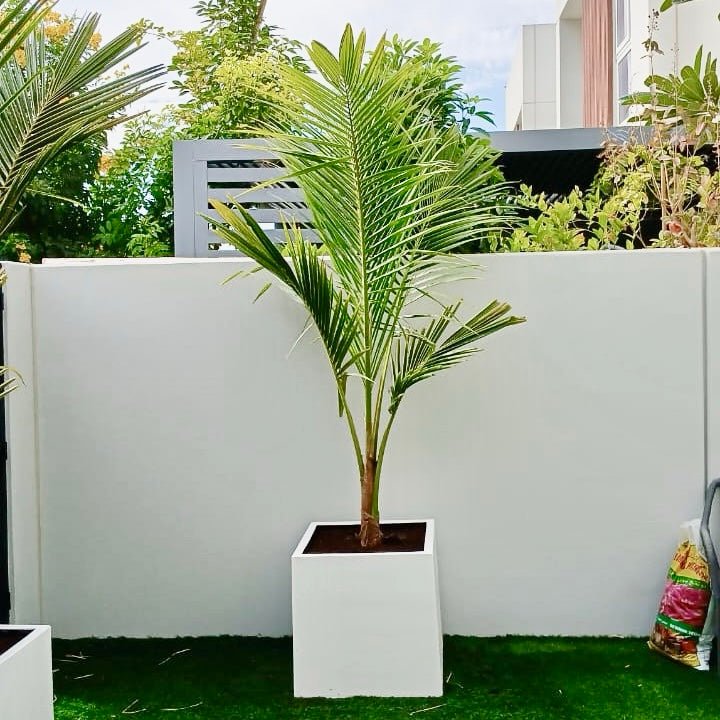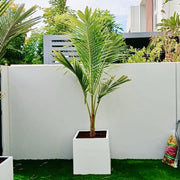Large Coconut Palm Privacy Plant - Enhance Your Space!
Free returns on all eligible orders
You have 7 days to request a return. All sale items are final sale.
A Large Coconut Palm Privacy Plant is a tall, tropical palm tree used to create natural privacy screens in landscapes, especially in warm coastal regions.
Here’s a detailed look at what makes the Coconut Palm (Cocos nucifera) an effective and attractive privacy plant:
🌴 Overview of the Coconut Palm
-
Botanical Name: Cocos nucifera
-
Height: Can grow up to 60–100 feet tall, though dwarf varieties stay shorter.
-
Appearance: Slender, ringed trunk topped with a crown of long, feather-like fronds.
-
Native Habitat: Coastal tropics of the Indo-Pacific, now naturalized in warm regions worldwide.
🛡️ Privacy Benefits
-
Vertical Screening: Its tall trunk and wide canopy provide overhead privacy, ideal for shielding upper balconies or rooftop patios.
-
Spacing Strategy: When planted in rows or clusters, coconut palms can create a tropical barrier that blocks views and adds lush ambiance.
-
Complementary Planting: Often paired with shorter palms or dense shrubs to fill gaps at lower levels for full coverage.
🌿 Growth & Care
-
Climate Needs: Thrives in warm, humid climates with temperatures above 70°F (21°C). Not frost-tolerant.
-
Soil Requirements: Prefers sandy, well-drained soil and tolerates salt spray, making it ideal for coastal areas.
-
Sunlight: Requires full sun for optimal growth.
-
Watering: Moderate watering; drought-tolerant once established.
-
Maintenance: Low-maintenance but needs space due to its size and falling coconuts.
🥥 Additional Benefits
-
Edible Fruit: Produces coconuts used for water, milk, oil, and culinary uses.
-
Eco-Friendly: Provides shade, reduces wind, and supports biodiversity.
-
Aesthetic Appeal: Iconic tropical look enhances resort-style landscapes and beachside properties.
⚠️ Considerations
-
Size: Not suitable for small yards due to height and root spread.
-
Safety: Falling coconuts can pose a hazard—regular harvesting or dwarf varieties help mitigate this.
-
Growth Time: Takes several years to mature and provide full privacy coverage.
If you're considering using coconut palms for privacy, they work best in spacious, sunny areas with a tropical climate.
Cocos Nucifera
Cocos Nucifera Palm Tree نخلة جوز الهند is large palm with a swollen, tapered base, an often-leaning grey trunk, and pinnate, bright green leaves, 4-6m long, with many linear leaflets.
Small, bowl-shaped, fragrant, cream to yellow flowers are borne at intervals throughout the year, followed by ovoid fruit, each with a green to ochre-yellow or orange-red exterior covering a fibrous brown husk. Height 20-30cm, Spread 12m. Native of Coastal tropical region
Temperature and Humidity
Coconut palms prefer temperatures that are at least 70 degrees. They grow best in temperatures between 85 and 95 degrees, and they might fail to thrive if the temperature dips below 64 degrees.
High humidity is an important factor, too. Maintain a moist environment for your palm with the addition of an in-room humidifier, as well as frequent spritzing of the plant with warm water.
You can also keep the container on a tray of pebbles and water to raise the humidity around the plant. Just make sure the bottom of the container isn't touching the water.
Watering
Like many plants that love warmth and humidity, the coconut palm is a thirsty tree. Keep the soil consistently moist but not soggy.
Use a moisture meter to evaluate the soil, and just before it gets dry, saturate it with room temperature water. Make sure the container does not become waterlogged, as this can result in root rot.
Fertilizer
Feed your palm year-round with a liquid fertilizer. Coconut palms are known to have several nutrient deficiencies, including a lack of phosphorus, nitrogen, manganese, and boron.
Seek out a fertilizer blend specifically made for Cocos Nucifera Palm Tree to supplement these losses, and follow label instructions for the amount and frequency of fertilization.








